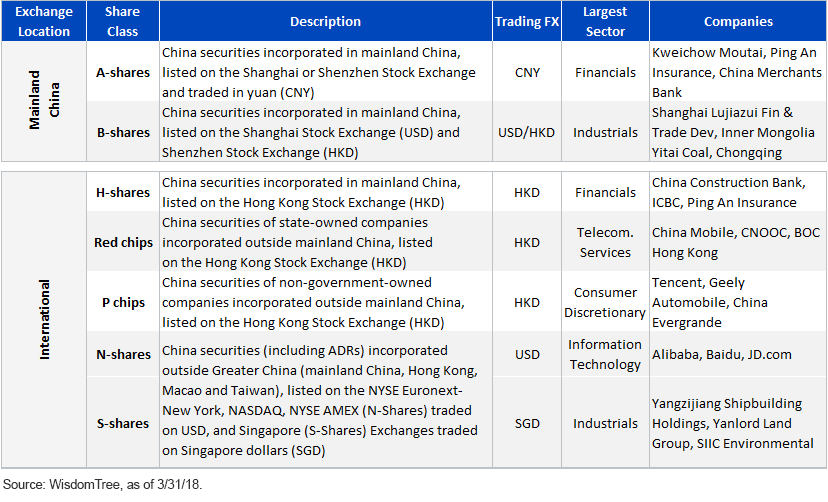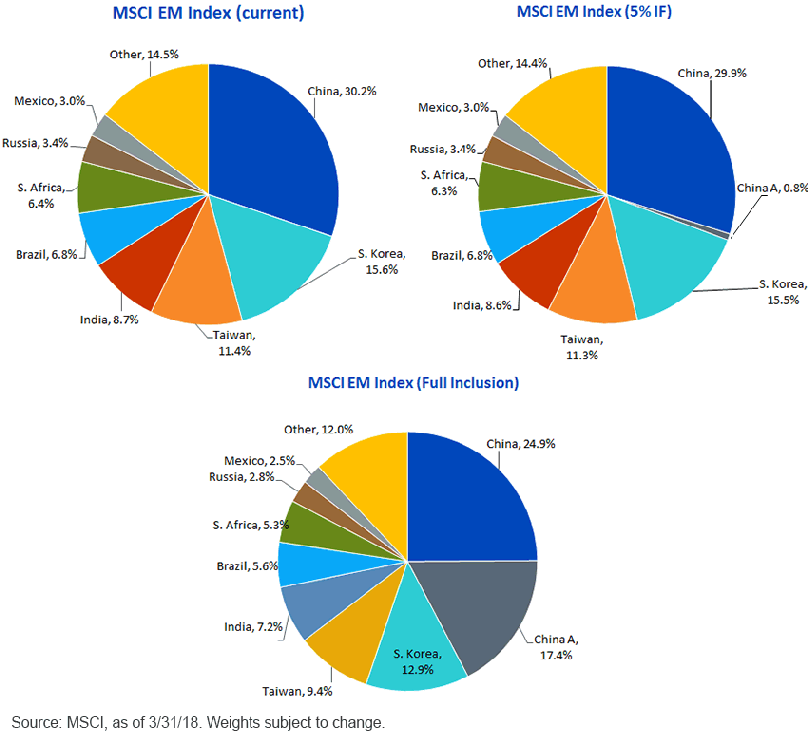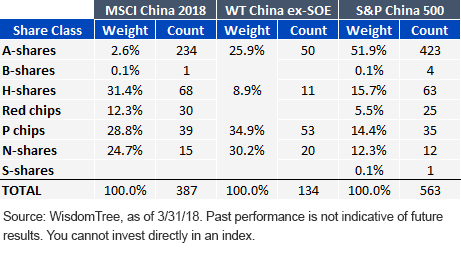Chinese Equities: Market Access, Equity Benchmarks & A-Shares



China has made significant progress along the path of liberalizing its economy and financial markets, but at least two large impediments remain: capital restrictions and state ownership. Since China does not fully allow the free flow of capital into (or out of) mainland China, Chinese companies have been forced to navigate a variety of trade-offs in determining where they should legally incorporate and where they should publicly list their equity. As a result, Chinese companies currently trade in five different currencies, on seven different exchanges, representing seven different share classes (shown below). Additionally, since the Chinese government may be a significant shareholder of certain businesses, a large portion of a company’s stock may not be eligible for trading.
Due to these complexities, Chinese equities currently only account for approximately 3% of global equity benchmarks, despite their companies making up 15% of global equity market capitalization.1 This will not always be the case, and one catalyst to narrowing the underinvestment is today’s inclusion of A-shares into the MSCI Emerging Markets Index. The market impact may be negligible over the coming weeks and months, but it is symbolic of a broader trend toward Chinese financial market inclusion and will heighten institutional investor attention on accessing this increasingly important market.
Share Classes, Currencies and Exchanges

Catalyst: The Market Impact of A-Shares
While some companies chose to list multiple share classes in different jurisdictions, companies listed in Shanghai and Shenzhen (A-shares) faced extremely limited access for international investors. After a series of capital market pilot programs and reforms, MSCI confirmed May 14 that it would be including 234 Chinese listed companies in the MSCI Emerging Markets Index. After a two-step process in June and September is completed, approximately .8% of the MSCI Emerging Markets Index will be Chinese A-shares. To limit market impact in the short run, MSCI sought to limit the number of holdings that were eligible and also cap their weights via a 5% inclusion factor. However, as we show below, should those 234 securities one day be eligible for full inclusion, Chinese A-shares would account for over 17% of the MSCI Emerging Markets Index. While the timing of full MSCI inclusion remains uncertain, we believe that it could occur over the next five years. In fact, we do not believe it is a coincidence that Chinese policy makers announced a 4x increase2 of the daily mainland stock quotas to take effect May 1 in order to facilitate these changes to emerging markets benchmarks.
MSCI China A-Shares Inclusion

Given our view that inclusion is likely to occur at a much more rapid pace than markets expect, we continue to advocate that investors should be over-weight in China generally via strategies that also provide meaningful exposure to A-shares. Thematically, we’re constructive on two different ways to approach Chinese equities:
1) China All Access
WisdomTree believes that with China likely accelerating market reforms, the concept of how beta is defined will likely undergo a dramatic shift. In our view, investors should seek exposure via the broadest/most inclusive indexes for Chinese securities. For this reason, we chose to collaborate with Standard and Poor’s (S&P) to provide exposure to the S&P 500 of China. Based on MSCI’s current methodology, A-shares could potentially grow to 41% of the MSCI China Index based on full inclusion. Today, the S&P China 500 Index has nearly 52% in A-shares listed Chinese companies.3 With over 400 mainland listed companies, we believe the index strikes a great balance between breadth and tradability.
Chinese Indexes by Share Classes

2) Ex-Stated Owned
The WisdomTree China ex-State-Owned Enterprises Index provides exposure to companies in which the government owns less than 20%. A large body of our research shows that government-owned firms are not always run for the benefit of shareholders, which negatively affects returns. This also creates a fairly dramatic shift in sectors away from “Old China” and toward “New China,” such as in the Consumer Discretionary and Information Technology sectors. This also results in less sector, share class and single stock concentration than the MSCI China Index. MSCI China has 64% of its weight in Information Technology and Financials, with over 30% of its weight coming from just two companies alone, and is a concentrated bet from a share-class perspective as well within primarily Hong Kong-listed shares. The WisdomTree China ex-State-Owned Enterprises Index conducted a special rebalance in August 2017 to include up to 25% exposure to A-shares.
Summary
The Chinese equity markets are changing rapidly. The country is home to some of the fastest-growing businesses in the world, some of them best-in-class, and it will be the beneficiary of increased institutional investor positioning in the market as capital market integration continues down its present path. Given these changes, we offer two approaches to China with different trade-offs that both merit investor attention. For a deeper look, check out our full white paper on these indexes.
1Sources: MSCI, World Federation of Exchanges, as of 3/31/18.
2RMB 52bn/42bn daily quotas for Northbound/Southbound increased from RMB 13bn/10.5bn.3Source: S&P, as of 3/31/18.
Important Risks Related to this Article
Investing in Chinese issuers involves special risks, including (but not limited to): currency devaluations and exchange rate fluctuations; intervention by the Chinese government (including risk of nationalization or expropriation); higher rates of inflation; greater political, economic and social uncertainty; market volatility; and lack of market liquidity. The Chinese financial sector is undergoing significant structural and regulatory changes, which have the potential to adversely affect the profitability of Chinese financial companies. The global deterioration of the credit markets since late 2007 generally has had an adverse impact on a wide range of U.S. and international financial institutions and markets. These domestic and global factors may make Chinese financial companies especially vulnerable to losses from rising interest rates, loan defaults, price competition, and credit and equity bubbles and crashes. Consequently, securities issued by Chinese financial companies may exhibit dramatic market price fluctuations. A Shares are equity securities issued by companies incorporated in mainland china and are denominated and traded in renminbi on the Shenzehen and Shanghai Stock Exchanges. Subject to minor exceptions, under current regulations in the People’s Republic of China, foreign investors can invest in the domestic securities market only through certain foreign institutional investors that have obtained status as a Qualified Foreign Investor (“QFII”) or a Renminbi Qualified Foreign Institutional Investor (“RQFII”) from the China Securities Regulatory Commission and have been granted a specific aggregate dollar investment quota.


